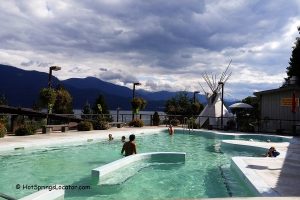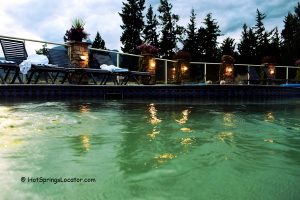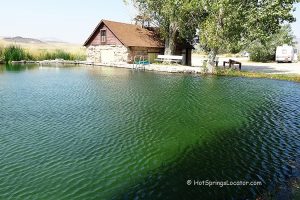• Mineral hot spring types depend on its mineral content
• Certain minerals and their combinations provide specific health benefits
People used hot mineral water for health, recreation, and religious purposes for centuries. We don't know for sure if our ancestors knew specific benefits they received from bathing in mineral springs, or if they just went off of experience and trial and error. However, with modern research into hot springs for health and wellness, we can pinpoint specific improvements you can get by taking a short or long retreat to one of the hot mineral water spots scattered throughout the globe.
US Food Drug and Administration states that the water must contain at least 250 parts per million (ppm) of total dissolved solids to be considered mineral water. Also, it must originate in nature and come from the underground water source. One of the most common ways to classify mineral water is by the amount and type of minerals it contains. The most common elements we can encounter in mineral water are calcium, sodium, sulfur, silica, and bicarbonate.
Mineral Spring Types - Classification
Sulfur & Sulfate Springs
Sulfur springs are characterized by hydrogen sulfide being a primary mineral source and can be easily identified by the smell of rotten eggs created by this element. The human body contains about 0.25% of sulfur, mostly in keratin. This is a protein type that makes up skin, nails, and hair as well as maintains collagen production which is critical for overall skin health.
In vapor form, water rich in sulfur dioxide has significant antibacterial properties helping fight bacterial infections and a variety of skin diseases. Evaporating sulfur dioxide water was showing to relieve respiratory conditions as well. In Europe, where mineral water treatment is a part of traditional medicine, sulfur-based hot springs are used to treat conditions such as psoriasis, dermatitis, fungal infections, and even gynecological problems. Sulfur water and mud are also used to relieve joint conditions such as arthritis and rheumatism.
Warning. In high concentrations, hydrogen sulfide is very toxic. Only bathe in verified hot springs. Individuals sensitive to sulfur should be very cautious as well since soaking in sulfur springs can cause an allergic reaction.
Sulfate springs water contains sulfate anions with different cations. It must contain over 200 ppm of sulfate ions in order to be considered as such. Sulfated water varies by sulfate type including magnesium sulfate, sodium sulfate, and calcium sulfate. Those elements are present in different amounts and combinations depending on the source. Bathing in sulfate springs is associated with improvements in digestion, liver and kidney conditions, as well as with the relief of constipation symptoms.
Saline or Salty Springs
Saline springs are salt-based springs with sodium, calcium, potassium, and/or magnesium as main minerals. Many salty springs have sodium chloride as a major mineral and this water typically has a neutral pH of 7. Being salty water, individuals on a low-sodium diet should avoid drinking it, but can still draw benefits by bathing in it. Saline hot spring water functions as a muscle relaxant, helps with joint issues like arthritis, helps with respiratory problems and skin diseases. It is also considered very beneficial for overall skin health and condition. In fact, Salty Springs offer benefits similar to seawater. The Dead Sea is a great example of a saline water source with 34 percent salinity and chloride content of magnesium (51%), sodium (30%), calcium (14%), and potassium (5%).
Bicarbonate or Soda Springs
Bicarbonate springs can be easily identified by water bubbling up because of carbon dioxide gas in it. Carbonic acid is formed if carbon dioxide in the water is over 250 ppm (milligrams per liter). Per European classification, spring water must contain over 600 ppm of bicarbonate elements like sodium bicarbonate or calcium bicarbonate to be considered a soda spring.
Soaking in bicarbonate water improves blood circulation which as a result positively affects all body functions. Especially, is it recommended for individuals with hypertension, mild atherosclerosis, and nervous system imbalances.
A number of studies have shown the health benefits of drinking a limited amount of bicarbonate water. It improves digestion, reduces bad cholesterol and fasting glucose in persons with diabetes, increases appetite, neutralizes gastric acid secretion, increases bile acid excretion, helps regulate peristalsis, improves metabolism of carbohydrates and fats, helps to treat chronic dyspepsia, gastric ulcer, and colitis.
Please, be advised that consumption of mineral water for the sake of disease treatment should not be self-prescribed, but rather recommended and supervised by a qualified health professional.
DO NOT drink water from untested sources as it can be contaminated with bacteria, harmful microorganisms, chemicals, and pollutants.
Silica Springs
You can often find silica in a hot spring, but it is uncommon to encounter a soaking spot with that mineral as a main component.
It comes in many forms as a compound made out of silicon and oxygen. In fact, this is one of the most common elements on Earth. It is found in many things, from sand and quartz to toothpaste.
Silica is also present in the human body in the liver, kidneys, bones, tendons, and blood vessels. It is essential for proper bone formation, cardiovascular health, and youthfulness. Silica improves the overall condition of skin, hair, and nails.
The major sources of silica in the human body are foods like brown rice, oats, leafy green vegetables, beets, and sunflower seeds. However, it can be absorbed by the skin as well. Silica works well with sodium, calcium, magnesium, and potassium in hot spring water to soften rough or dry skin and increase overall well-being.
Radon Springs
Radon is a radioactive inert gas and a known carcinogen associated with lung cancer. However, in trace amounts (25-30 nanocuries per liter) it helps to treat skin diseases, diabetes, neuralgia, rheumatism, arthritis, and gynecological issues. Radon therapy is used through bathing, inhalation, or steam in European spas, but is not approved in the United States.
Minerals in Hot Spring Water & Health Benefits
A huge variety of minerals and their combinations in hot mineral water offers bathers an opportunity to improve their overall wellbeing and pick the health benefits they need the most. Here is the list of the most common health benefits broken down by the mineral.
Sulfur (Sulfate)
- Helps to protect the body against free radical damages
- Prevent joint inflammation
- An important element of keratin, which is a protein forming skin, hair, and nails
- A critical part of collagen production
- Promotes retention of water for cartilage and joint health
- Resists bacteria responsible for skin conditions such as rashes, eczema, acne, psoriasis, and dandruff
- Promotes communication between neurons
- Improves metabolism.
Silica
- An important part of elastin and collagen making up bones, cartilage, blood vessels, and skin
- Promotes health and overall conditioning of skin, hair, and nails
- Relieves arthritis pain
- Critical for mineral absorption in bones
- Prevents osteoporosis.
Calcium
- Critical for healthy bones, essential for elderly people and youth
- Necessary for hormone and enzyme production
- Essential for muscle and blood vessel contractions
- Plays a role in nerve impulse transmission.
Sodium
- Maintains the balance of the body's fluid and minerals
- Needed for nerve and muscle functions
- Relieves joint pain
- Stimulates the lymphatic system.
Bicarbonate
- Improves blood circulation in the body's extremities
- Helps manage hypertension and atherosclerosis
- Neutralizes the acidity of body fluids.
Minerals Found in Trace Amounts
Boron helps with muscle building and maintenance.
Magnesium is important for the proper functionality of the nerves and muscles, relieves muscle tension, tightens the skin, and assists in better calcium absorption for bone health.
Selenium is an antioxidant, important for the proper functioning of the thyroid gland.
Potassium optimizes cardiovascular rhythms, helps nerve impulse transmission, regulates the body's fluid balance, and decreases blood pressure.
Lithium improves overall brain function and memory, treats depression and other mood disorders.
Arsenic assists tissue growth and has anti-fungal properties.
Iron is necessary in hemoglobin production.
Disclaimer
This content provides general educational information only. It does not intend to substitute for professional medical advice, diagnosis, or treatment. We make no medical claims. Always consult your medical provider for more information.
You May Also Like








